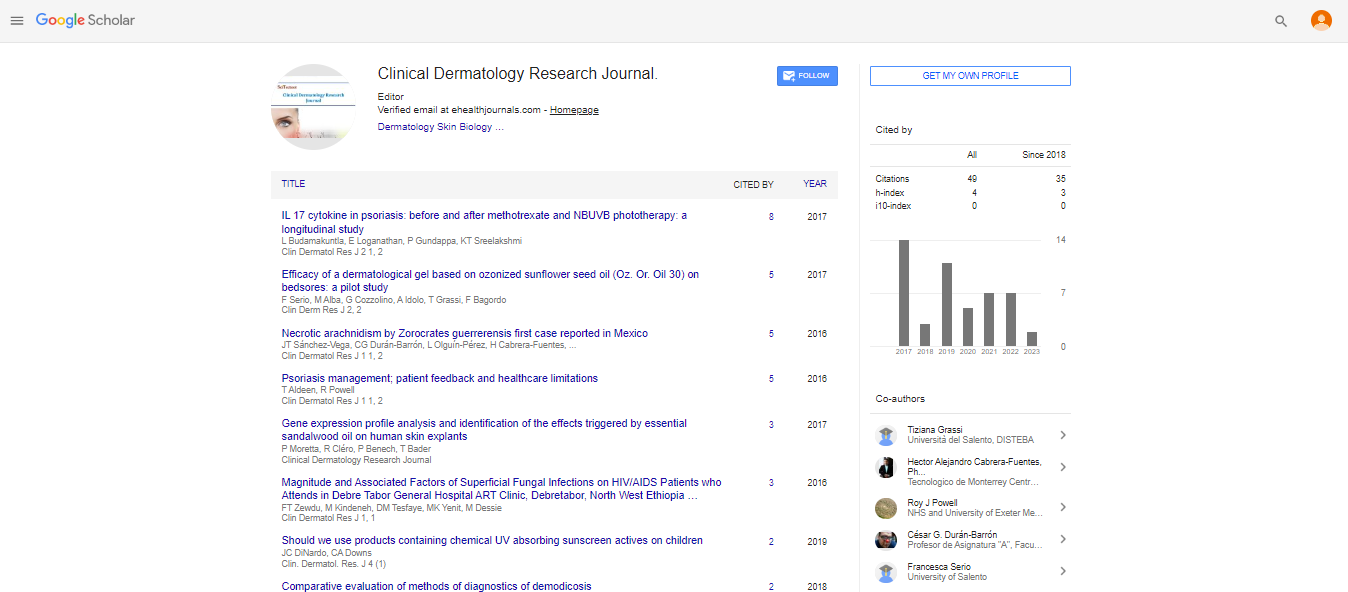Opinion Article, Vol: 8 Issue: 3
Herbal Solutions for Healthy Skin a Comprehensive Dermatological Overview
Muriel Paula*
1Department of Dermatology, University of California, San Francisco, San Francisco, California, USA
*Corresponding Author: Muriel Paula,
Department of Dermatology, University of
California, San Francisco, San Francisco, California, USA
E-mail: Ahmad.maeve@hsc.edu
Received date: 30 August, 2023, Manuscript No. CDRJ-23-115487;
Editor assigned date: 01 September, 2023, PreQC No. CDRJ-23-87PQ)
Reviewed date: 15 September, 2023, QC No. CDRJ-23-115487;
Revised date: 22 September, 2023, Manuscript No. CDRJ-23-115487(R);
Published date: 29 September, 2023, DOI: 10. 4172/2576-1439.1000213
Citation: Paula M (2023) Herbal Solutions for Healthy Skin a Comprehensive Dermatological Overview. Clin Dermatol Res J 8:3.
Description
The pursuit of healthy and radiant skin has been a timeless endeavor for humans across cultures and generations. In the quest for skin health, individuals have explored various remedies and treatments, both conventional and alternative. Among these alternatives, herbal solutions have gained popularity for their natural and holistic approach to skincare. This essay provides a comprehensive dermatological overview of herbal solutions for healthy skin, delving into their efficacy, safety, and the scientific basis behind their use.
Herbal remedies for skincare are not a modern invention but rather a practice rooted in ancient traditions. Throughout history, civilizations worldwide have harnessed the healing power of plants to maintain and enhance skin health. The Egyptians, for instance, used aloe vera for its soothing properties, while Ayurveda in India has a rich tradition of herbal skincare remedies dating back thousands of years. These historical practices laid the foundation for the contemporary use of herbal solutions in dermatology.
Herbal ingredients and their benefits
Herbal skincare relies on a wide array of botanical ingredients, each offering specific benefits to the skin. Some of the most commonly used herbal ingredients and their dermatological advantages include:
Aloe vera: Aloe vera is renowned for its hydrating and soothing properties. It can be used to alleviate sunburn, reduce inflammation, and promote overall skin healing.
Tea tree oil: This essential oil has antimicrobial and antiinflammatory properties, making it effective against acne and various skin infections.
Chamomile: Chamomile has anti-inflammatory and antioxidant properties, making it ideal for soothing irritated skin and reducing redness.
Turmeric: Turmeric contains curcumin, which has antiinflammatory and antioxidant properties. It can help with conditions like eczema and psoriasis.
Lavender: Lavender oil is known for its calming and antiseptic qualities. It can help with minor burns, insect bites, and stress-related skin issues.
Green Tea: Green tea is rich in antioxidants, particularly epigallocatechin gallate (EGCG), which can help protect the skin from UV damage and reduce signs of aging.
Calendula: Calendula has wound-healing properties and is often used in creams and ointments to promote skin repair.
The use of herbal solutions in skincare is not solely based on tradition; there is a growing body of scientific research supporting their efficacy. Many studies have investigated the bioactive compounds in these herbs and their effects on the skin. For instance, aloe vera has been found to contain polysaccharides that stimulate collagen production and skin repair. Similarly, the antimicrobial properties of tea tree oil have been well-documented, making it a valuable tool in the management of acne.
Furthermore, herbal extracts are increasingly being incorporated into dermatological formulations. Products containing green tea extracts, for instance, have demonstrated their ability to protect the skin from UV radiation, reducing the risk of sunburn and skin aging. Calendula-based creams have also been shown to enhance wound healing and reduce inflammation.
One of the significant advantages of herbal solutions for skincare is their generally favorable safety profile compared to some synthetic skincare products. However, it's crucial to note that allergic reactions or sensitivities can occur with herbal ingredients, just as with any other substance applied to the skin. Patch testing is recommended when trying a new herbal product, especially for individuals with sensitive skin or a history of allergies. Moreover, the potency of herbal extracts can vary depending on factors such as plant species, growing conditions, and extraction methods. Therefore, it is essential to choose products from reputable sources to ensure their quality and efficacy.
Herbal solutions for healthy skin are not meant to replace conventional dermatological treatments but can often complement them. Dermatologists may recommend or incorporate herbal remedies into a patient's skincare routine to enhance treatment outcomes or reduce side effects of other therapies. For example, herbal ingredients like chamomile and calendula can be used to alleviate the skin irritation associated with topical medications. While herbal solutions can play a vital role in promoting skin health, it's essential to recognize that skincare is not solely about external treatments.
Lifestyle factors, such as a balanced diet, hydration, adequate sleep, and stress management, also significantly influence the condition of the skin. Integrating these practices with herbal skincare can yield the best results. Herbal solutions for healthy skin offer a holistic and timetested approach to skincare, drawing upon the wisdom of ancient traditions and supported by scientific research. The use of herbal ingredients such as aloe vera, tea tree oil, chamomile, and turmeric can provide a range of benefits, from soothing irritation to combating acne and signs of aging. Importantly, herbal remedies can be integrated into conventional dermatological treatments to optimize results. As individuals continue to seek natural and sustainable approaches to skincare, herbal solutions remain a valuable and effective option for achieving and maintaining healthy, radiant skin.
 Spanish
Spanish  Chinese
Chinese  Russian
Russian  German
German  French
French  Japanese
Japanese  Portuguese
Portuguese  Hindi
Hindi 

